- Home
- Sonya Hartnett
The Midnight Zoo Page 2
The Midnight Zoo Read online
Page 2
Tomas rummaged inside the packs for their sister’s many requirements; while Andrej cleaned her with hanks of grass and dried her with a scarf, Tomas uncapped a bottle of milk and pulled a teat over its rim. They’d traded ten plaited leather bracelets for the teat and bottle, the shepherd girl bargaining hard and Andrej agreeing in desperation and reluctance, knowing the deal wasn’t fair. The bottle was made for feeding lambs, and when they’d first begun using it Wilma had objected to being fed like a lamb; but she had grown accustomed now, and had possibly forgotten ever drinking as a human baby is supposed to. Having cleaned and dried his sister, Andrej shook out a rectangle of calico and folded it deftly around her bottom, securing the cloth into place with two pins. Tomas felt the usual dart of admiration when, passing the needle through the calico, his brother slipped his fingers between the baby and her diaper so any wayward pinpoint would pierce him, not her. Their mother had done this — Andrej had learned the trick from her — but Tomas didn’t believe himself brave enough to do the same. Just the thought of that biting, unpredictable pain was enough to give him the shivers. Fortunately his task was to warm the milk as best he could, by holding the bottle against his stomach and rubbing it with his hands.
Though it was the middle of summer the night was faintly cool, so Andrej selected a woolen shawl from among the rags in Tomas’s pack; pressing the baby’s limbs to her body he wrapped her up snugly, leaving only her face exposed to the air. Then he scooped the infant from the ground and placed her in Tomas’s arms; Tomas pushed the teat into his sister’s mouth before she could comment, and finally the brothers were freed to consider the wolf.
Which stood as if carved from granite, gazing back at them. It did not seem to breathe. After a moment, its black nose tipped sideways: “It smells us,” Andrej was moved to say. He knew that a wolf could detect the scent of almost anything — a snowflake fallen the previous winter, the bones of an elk dead for years — but it was strangely wonderful to know that the animal was smelling them. That they had crossed over into the life of this great grave beast. “I want to pat it,” Andrej realized.
“It will bite you.”
Andrej knew it: he hunkered in the tangling grass, laced his fingers between his knees. The breeze blew through the maple branches above them, pushing leaf shadows across the earth. Moonlight shone on the bars of the cages like satiny snail trails. It wove into the wolf’s mottled coat, sparkled on the tip of each hair. The wolf continued to stand like sculpture, but in the enclosures that surrounded it many living things were moving, sniffing, turning their eyes and licking their teeth. Andrej couldn’t see this, but he felt it. Restlessly he asked, “Is she asleep?”
Tomas glanced at the baby. “No, but she’s happier.”
Andrej squeezed his palms together, tamping down his impatience. He didn’t want his investigation of the zoo to be disturbed by further demands from his sister, so he would wait until she was satisfied. He listened to the breeze, to the sough of voices it coaxed from the fleshy maple leaves. He heard it moseying around the village beyond the wrought-iron fence, drawing sighs from crushed roofs and whistles from smashed shutters. The wolf turned an ear a little, and Andrej wondered what it was hearing. Tanks churning through burning cities perhaps, or whales talking to one another in the sea. Uncle Marin had said, “A wolf can hear your heart beating before you’re even born.” Can you? Andrej longed to ask it. Can you hear my heart?
“I think she’s had enough.” Tomas lowered the bottle. He held the baby upright and rubbed her back, not knowing why this should be done but knowing his mother had done it. Wilma sagged in his hands, kecking and gasping, and after a minute spat out a slug of milk; Tomas sopped it up with his sleeve. He wagged his fingers in her face, said, “Wilma! Little Wilma?” and she mewed contentedly. When he went to lay her in the nest of his pack, however, her eyes widened, her mouth contorted, and she gave a cry. The sound made the wolf take a step — Andrej saw twin flames of moonlight flare in its eyes. “She doesn’t want to sleep,” said Tomas. “I think she wants to see the zoo.”
“Give her to me.”
Tomas handed his sister over gladly, wiped his hands on the grass. He hoisted his baggy trousers and adjusted the belt at his hips. The jacket he wore was too large for him, and the sleeves required constant folding if they weren’t to dangle beyond his hands: but Andrej was already walking away, and Tomas yelped, “Wait!” and skipped to catch up, leaving the sleeves flying like flags.
The first thing the brothers discovered was that, although it was the biggest zoo they’d ever seen, this zoo was small. The maple leaves that had reminded Andrej of a sprawling forest all belonged to a single tree which stood in the center of a circular arena of grass. Around the circumference of the grassy circle stood the cages, each shoulder to shoulder with the next so their bars formed an enclosing barrier interrupted only by the pebbly path that led back to the street. It was a place arranged like a buttercup — the rounded center, the pens radiating like wedge-shaped petals — which explained, Tomas supposed, why the zoo was also called a garden, despite the absence of flowers and flower beds. But at the foot of the tree, there was a green bench for sitting on, and beside the seat lolled a marble mermaid on a plinth. A visitor could sit on the bench and scan the entire zoo with just a turn of the head.
The wolf, Andrej felt, had looked at them enough: he began his exploration at the cage which stood beside the pebbled path, which was also the cage farthest from the wolf’s. The children came close to the bars and looked through them. In the moonlight the enclosure seemed empty but for a faint wheaty smell, a wodge of pigeon feathers, and perches made from the branches of a fir tree; a high far corner was shielded by sheets of metal that cupped a square of inky blackness. The floor of the cage was stone — looking about, Andrej saw that all the enclosures had polished stone floors which shone lividly under the moon — and was untidily splotched and splattered. Black bars extended across the roof of the cage, and across the roofs of all the cages. Sunlight and raindrops and fog and snow could drift down into the pens, but no animal could climb upward to freedom.
Tomas had his nose pushed between the bars. “Maybe no one lives here?”
“No.” Andrej felt sure that something was hunched in the inky corner, looking back at them. A sign was fastened to the bars, and he stood on his toes to study it. There were words he couldn’t read, but he understood the one written largest: OREL. “It’s an eagle,” he told his brother.
The boys contemplated the angle of shadow. They knew now what they were looking for — a glint of talon, a falling, lancelike feather — yet still they couldn’t see it. Only the splashed floor promised that the bird was in there — this, and the fact that the iron bars formed a stalwart birdcage that not even an eagle could escape. Andrej shifted Wilma from one arm to the other. “Let’s keep going.”
Tomas rushed to the next cage, pressed himself to the bars. “Oh! Andrej! Look!”
They didn’t need to read the sign that said MEDVED. The bear was lying at the rear of the cage, its brown chin resting on the stone, its paws curled beneath its sprawled body. Its ears were like toppled teacups, the same shape and size. Although part of the roof was covered by a sheet of decorative metal, the bear, unlike its neighbor the eagle, had no sheltered corner in which to hide: the moonlight invaded its sorrel coat electrically, made mirrors of the small eyes which glanced glassily at the children and away. It did not growl or groan. Its cage smelled breathtakingly unfresh, like an opened grave. There were wads of hay clumped about the floor, and a weed growing from a crack in the stone. In the center of the pen was an overturned pail meant to hold food or water. “That’s a sad bear,” Tomas realized, and Andrej agreed, “Yes, it is.”
The next enclosure was crisscrossed by a network of thick ropes. Its inhabitant was waiting for them at the bars, chittering tensely. The sign said OPICE, but exactly what kind of monkey it was, Andrej could not decipher. The creature was the size of a scrawny cat and, but for an area
of nakedness around its glittering eyes, equally as furry as a cat, its ginger coat sheenless but groomed. It gripped a rope with clever feet, craned its walnut-creased face to the children, and reached out a sinewy arm. Its hand was as perfect as a doll’s, its fingernails tinier than Wilma’s, yet there was something intimidating about that limb: Tomas kept carefully beyond its reach. “Does it want to shake hands with me?” he wondered.
“I think it wants food.”
“Can we give it something?”
“Maybe later. Keep going.”
The monkey raced along the ropes as they walked by, its fearful baby face fixed on them. Halted by the bars that separated its cell from the next, it crouched with black eyes blazing, whining and grinding its fangs.
Stopping at the next cage, Tomas said, “Oohh.” Although the sign read LEV as well as LVICE, there was only a lioness in the pen, lying with her thick legs folded over each other, motionless but for the tail that swished serpentinely in response to the monkey’s grizzling. In the lacy moonlight she was the color of a princess’s gown, a fine white-gold. She betrayed nothing of what she felt when she opened her lime eyes and saw the children staring: “How beautiful she is,” Tomas marveled. Her tail continued to jump as the boys moved away, as if, once started, it was difficult to stop; but her eyes closed, and she made no further move. Her cage was dirty, and smelled wickedly. There was a brown roach running in circles at the bottom of her empty water pail. Both Andrej and Tomas noticed, but neither mentioned it.
Set into the floor of the next enclosure was a swimming pool. The water had a moldery smell, and even in night’s dimness looked green. Cruising in the murky depths was a long dark shape that seemed more liquid than flesh: reaching one end of the pool, it flipped with impossible grace and glided back the way it had come, only to flip again, and return. Back and forth the water-being swam, streamlined as an arrow, running as if on tracks, causing hardly a ripple on the surface of the water. The sign on the bars said TULE, but the beast seemed something more fantastical than a seal. “Put your head up!” Tomas called. “Let us see you!” But the seal only glided steadfastly back and forth.
The next cage belonged to the wolf. It had retreated to the rear of its enclosure and stood lowering, its nose almost touching the stone. Like the lioness’s and the bear’s, the wolf’s pen had a partial pressed-metal roof for keeping out the weather, but no concealing corner in which the animal could hide. Its uncleaned cage smelled strongly, but not as badly as the bear’s. It watched the children pass by, and raised its eyes when Andrej, seeking the sign, raised his own. VLK.
The monkey was still pleading in a piercing, agitated voice. It was an unnerving sound to hear against the gray sky, the icy plate of moon, the ghostly village beyond the fence. “Can’t we give it something?” Tomas asked. “Just a biscuit?”
“If we feed the monkey,” Andrej answered, “we’ll have to feed them all.” And Tomas knew that feeding all the animals would leave nothing for themselves, and that what little they had could never fill such gigantic stomachs anyway.
The sign on the next pen announced KANEC. The cage was draped by the shadow of the maple, and though they could detect a familiar woodland odor, they couldn’t see through the darkness to the boar. Andrej was struck by a feeling of unease: Uncle Marin had told him that the wild boar was almost as clever as the wolf, but much, much easier to insult — and a caged boar, famished and disgruntled, might regard boys and babies as insulting indeed. He held Wilma more securely to him, cautioned his brother, “Don’t go too close.” Tomas stepped back from the bars and the boys searched the gloom, but they couldn’t see the animal, and moved quietly away.
A corner of the next pen was littered with small dark pellets, but the cage smelled no worse than a barn or stable. Tomas put his nose between the bars but couldn’t make out the details of the creature folded against the farthest wall. “A deer? A gazelle?”
“A chamois.”
“A chamois?” Tomas had seen chamois roasting on spits at feasts. Everybody he knew had eaten bits of one — he himself had eaten platefuls of the scarlet, spicy meat. It was ridiculous to have a chamois at a zoo — like having a rat in a cage, or a sparrow. He shook his head and strode on, resenting being taken for someone easily impressed. They had almost completed the circuit of cages and he hoped the last ones concealed something startling, like a dragon or a frantic crazy man who ate broken glass and chair legs, like the fellow he’d once seen in a sideshow.
LAMA said the sign: the llama got awkwardly to its feet as the children reached its pen, staring at them through heart-meltingly large, lashy eyes. Its woolly coat, a patchwork of white and russet, reminded Andrej of the blankets he’d slept under in the caravan. Its bony face, topped by tufty ears, sat high on a shaggy neck, genial, and slightly daft. “It’s friendly!” Tomas decided, and slipped an arm between the bars. The llama bucked with alarm and veered away, gazing back at them grievedly from a far corner. Tomas withdrew his hand regretfully. “I only wanted to pet you.”
The next cage was the last. Like the others, it had a smeared stone floor, an ornate roof of metal, iron bars across the top and around each side, and a shallow drinking tray that was stained by dried raindrops. The animal inside was the size of a sitting dog, and almost the same shape as one, except that in every aspect it was different from a dog. Its head was dainty but sturdy, like a jeweler’s hammer; its front legs were twiggy while its rump and rear legs formed a muscular, meaty ball. Its tail was long and pointed, its coat the color of smoke. “What is it?” asked Tomas. He’d never seen such a thing.
Andrej sounded the sign out to himself before trying it aloud. “Klokan.”
“I’ve never heard of that.” Tomas leaned in to look. Andrej had never heard of kangaroos either, and wondered if Marin knew about them. “I like it,” Tomas decided: a kangaroo wasn’t a dragon, but it was pleasingly peculiar, and, for all that Tomas knew, might indeed be capable of breathing fire.
They had reached the pebbly path again, having walked the complete circle of the zoo. Wilma was sucking Andrej’s thumb, almost asleep. Sleepiness weighed her down, she was heavy in his arms. He crossed the grass to the bench beneath the tree, and Tomas dawdled after him. Only when he sat did Andrej realize how footsore he was, how nice it was to sit. He arranged the baby on his knees, loosened her swaddling, sponged her drool. Tomas had stopped beside him and was looking at the cages, up at the peaceful maple, across at the marble mermaid. The monkey was still crying peevishly, but the other animals were standing and lying in a kind of resigned, silent, destitute grace. “What is this place, Andrej?” Tomas asked finally.
Andrej looked up. “A zoo. I don’t think it’s a fancy one. It doesn’t have many animals.” And most of them — the wolf, the eagle, the bear, the chamois, and the invisible boar — were not exotic, but creatures which lived wild in mountains only a few days’ travel from here, animals of the kind Andrej had glimpsed occasionally during expeditions into forests with his uncle. The beasts he’d seen in the forests, however, had been quick and liquid and vital, alive in their skins; these caged ones were not like that. “Someone built it because they wanted to show how much money they had, or because they liked animals, or wanted to keep them prisoner. Or maybe the people from the village built it, so they’d have something to show visitors. I don’t know.”
“I didn’t mean that.” Tomas’s birdie face twisted, struggling with what he did mean. “Why is it?” he asked. And what he meant was why was the zoo still standing, when so much had been destroyed? Why did this strange elegant place exist so perfect and unmarked, when shops and caravans and trees and roads and streams and whole fields, entire cities, eternal hills had disappeared? Unable to explain himself, Tomas’s shoulders slumped. Lately he felt he’d been wrestling all his life to make sense of the world.
“I don’t know why,” answered Andrej truthfully; but why ever it was, it meant that no soldiers had ever been in this place, they hadn’t trampled the grass or
flicked cigarette butts into it, they had never looked from beneath the brims of their caps and seen what Andrej and Tomas were seeing. Andrej had once accompanied his father on a visit to a glassblower and the memory came to him of the glassblower’s furnace, the savage fire within — and the orb of molten blue glass that the blower had spun amid the flames, the single most beautiful thing that Andrej had ever seen. “I want to touch it,” he had murmured, embarrassed to be saying the words. His father had laughed his fine, warmed laugh. Andrej’s heart panged now, remembering it.
Wilma gurgled, the first noise she’d made in some time, and Andrej glanced at her. And then he realized he’d only heard her because the monkey had ceased its noisy pleading for food. Looking up, he saw that the creature still hung to the bars of its cage, but it wasn’t watching the children now. It was silent, and its face was turned to the sky.
Apprehension ran through Andrej like a cool, rank stream. He turned and saw that other animals were also staring at the sky. The wolf, the lioness and the kangaroo had all raised their noses to the night. The wolf’s ears were drawn back so their peaks almost touched. The llama stood quivering, stamping a leg. The chamois had emerged from the gloom to stand in the center of its pen, its roan coat twitching, horns lowered to fight.
Uncle Marin always said, An animal hears and sees and senses much more than you and I. “Tomas,” Andrej breathed, and didn’t know what else to say, and had no chance to say it anyway.
The airplanes came from nowhere — perhaps from behind the broad platter of the moon, perhaps from inside a star. Against the soft gray sky they were as black and stiff as a trio of undertakers. As they crossed the space above the zoo Andrej felt the power of their engines in the core of his bones, felt his blood shaken like foam in a bottle. Side by side the airplanes flew, steady and casual but thrumming determinedly, the tips of their wings nearly touching. As they passed overhead the air seemed to flatten and gush keenly, like a great knife flung in their wake; leaves were torn from the maple tree and sent spinning like juggler’s plates.

 Butterfly
Butterfly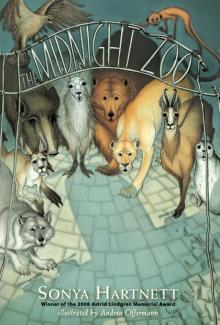 The Midnight Zoo
The Midnight Zoo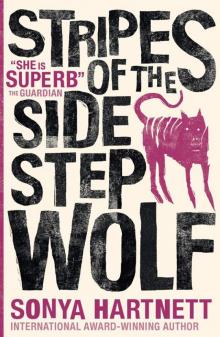 Stripes of the Sidestep Wolf
Stripes of the Sidestep Wolf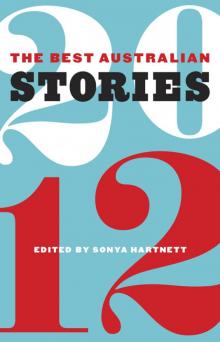 The Best Australian Stories 2012
The Best Australian Stories 2012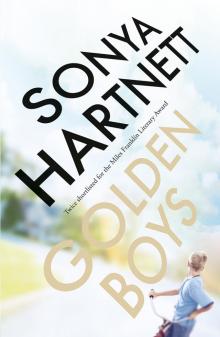 Golden Boys
Golden Boys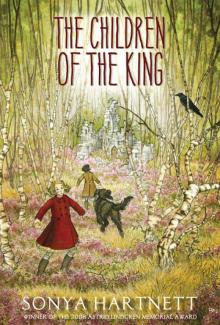 The Children of the King
The Children of the King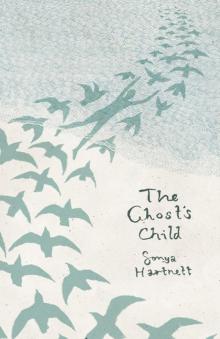 The Ghost's Child
The Ghost's Child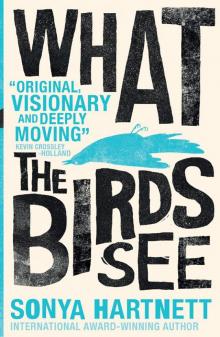 What the Birds See
What the Birds See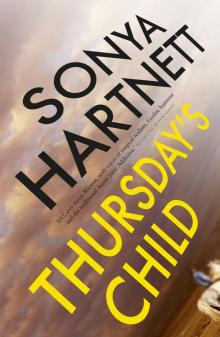 Thursday's Child
Thursday's Child